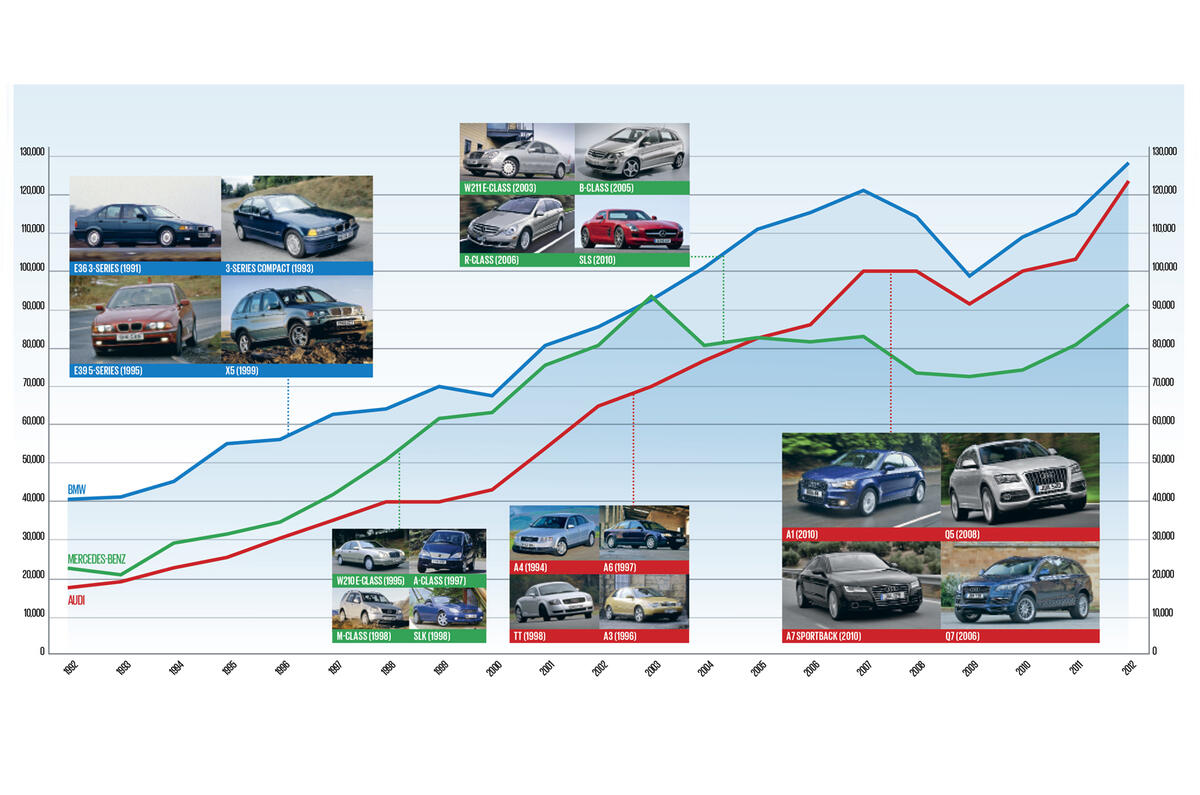Last year, 2.03 million cars were sold in the UK and the German big three — Audi, BMW and Mercedes — took a healthy 17 per cent of the market. What’s more, those 342,000 cars were virtually all sold at premium prices and with a healthy profit margin.
The rise and rise of premium brands has been one of the biggest stories in the UK new car market. While volumes and margins have been crumbling for the mass-market brands, the premium badges have made steady strides over the past two decades.
BMW, the best established of the three back in 1992, has more than trebled its volumes, from 40,000 units per year to 127,000 units. Mercedes has added about 69,000 units, a four-fold rise on its 1992 sales.
Audi, by contrast, has increased its volumes nearly nine-fold. The UK sales of the Volkswagen Group’s star performer have jumped from just 14,000 units in 1992 to 123,000 last year.
There’s no doubt that the UK has become a much more brand-orientated consumer market since the turn of the century. BMW sales grew steadily from 40,000 in 1992 to 67,600 in 2000, but by 2001, its sales had jumped to 81,000 in a single year.
This event is particularly fascinating because BMW had broken up and sold off the Rover Group in 2000, a seismic event in UK politics that dominated newspaper front pages for weeks. BMW was so worried by the potential backlash from UK buyers that it engaged market researchers to monitor the impact on its brand. Clearly, the company need not have bothered.
BMW’s and Audi’s figures also show the effect of the economic growth in the early 2000s, which was powered by an economy boosted by low interest rates and a housing boom. Between 2001 and 2008, Audi’s sales leapt from 43,600 to 100,845 units, while BMW’s jumped from 67,676 in 2000 to 121,575 in 2007.
What’s really remarkable is the resilience of the demand for Audi and BMW. Even in the middle of the credit crunch, BMW sales only dropped to 98,683 units (higher than in 2003), and then sprang sharply back into triple digits.
Audi’s performance was almost identical. It dipped from 100,845 (only a single sale lower than in 2007) to 91,172 units in 2009, which was still higher than in 2006. Audi was only a fraction short of three figures by the end of 2010.
All of this not only illustrates how premium brands managed to ride out a serious recession, but it also shows that a policy of massively diversifying the range of available models pays dividends when trying to retain existing customers





Join the debate
Add your comment
you all must be crazy
Having actually driven some different cars over the years how can you conclude that german cars do not deserve their reputation, BMW's and Merc actually deserve their reputation albeit for different reasons.The quality of the product generally speaks for itself, look at a 10-15 years old german car in comparison to a Rover 100 or any other car from around the world for that matter. I'm no inherent german lover however the facts are the facts. I have a 12 year old e39 and it still works well no sqeaks or rattles from it, I still feel inclined to spend good money on it if need be...can you say the same about a similar ford, renault, toyota?
405line wrote: Having
Dont get me wrong, I like BMW's and have owned one. My dad had a series of BMW's & Mercs over the years, most of which were great. I'm a bit less sold on Audi to be honest as to me they reek a little of "style over substance" but each to their own.
Audi?
I was careful not to to include Audi as I am a driving enthusiast.
oktoberfest should be celebrated throughout the UK
We just love Ze Germans.
Anyone who attended the olympics saw the impact of the BMW's ferring the athletes round the city. Biggest British event for at least a generation and BMW were flying the flag for us.
Why no analysis in a why/how article?
Wierd, no analysis. Just stats! Autocar, do you want us to do your job for you and do the analysis?